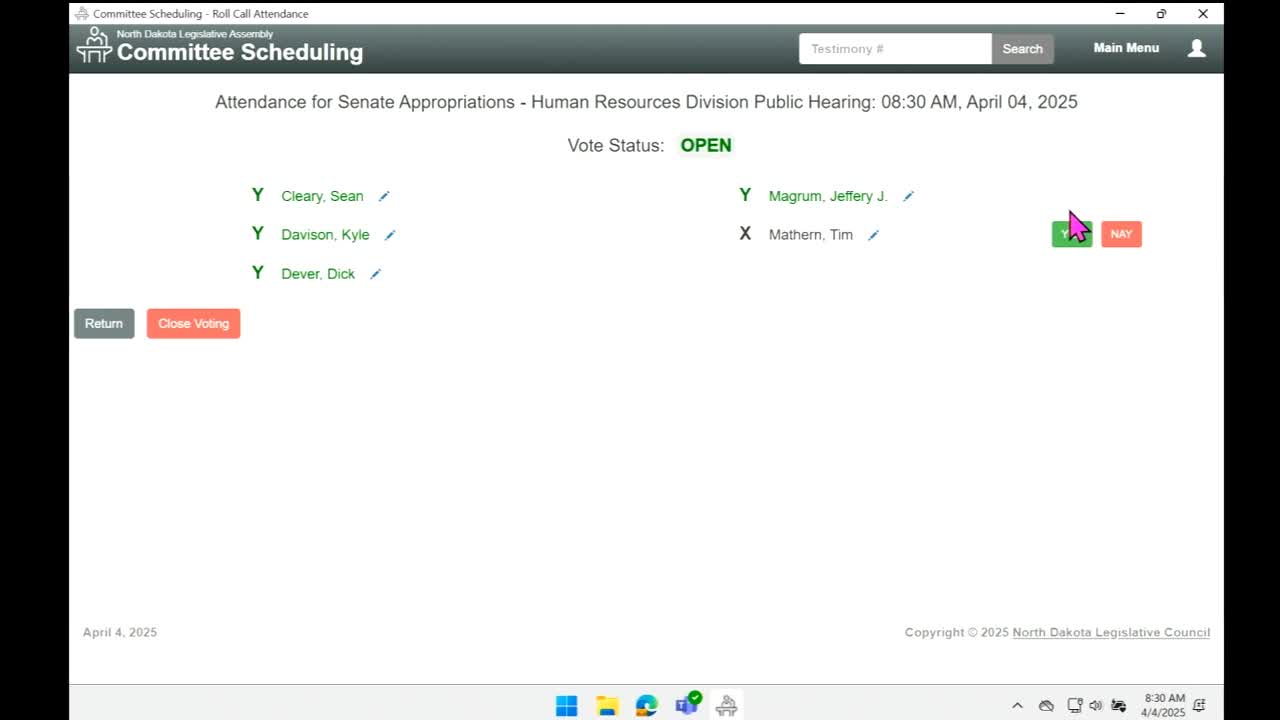Division sends House Bill 12-25 to full committee after split votes over firearm penalty and habitual-offender change
Get AI-powered insights, summaries, and transcripts
Subscribe
Summary
Lawmakers debated changes to reckless-endangerment penalties and the habitual-offender statute. The division split on removing a firearms penalty provision and ultimately issued a do-not-pass recommendation to carry the bill to full committee; the Department of Corrections— fiscal note projects increased prison costs tied to the firearms penalty.
The Senate Appropriations Committee Human Resources Division on April 3 debated House Bill 12-25, a bill that would raise certain reckless-endangerment penalties when a firearm is used and would amend the habitual-offender statute to allow felony convictions from other states to be counted.
Representative Lawrence Clamine, who introduced the bill at the request of the North Dakota State—'s Attorneys Association, told the division the measure combines two prior proposals related to criminal statutes in chapter 12.1. "Section 1 relates to reckless endangerment. Currently, there are 2 levels of penalty, a class C felony if the offender acted with extreme indifference to human life. Otherwise, it's a class A misdemeanor. The bill increases the penalty to a class B felony if the individual used a firearm in committing the offense of reckless endangerment. The reason for the increase in penalty is because of the rise in offenses using guns," Clamine said.
Clamine also described Section 2 as a change to the habitual-offender statute intended to allow courts to treat felony convictions from other states the same as North Dakota felonies. He told the division: "A felony is a felony regardless of the maximum punishment." He cautioned that the bill—s fiscal note applies only to the firearm-related change in Section 1.
The Department of Corrections and Rehabilitation (DOCR) supplied the fiscal note cited at the hearing. Committee discussion referenced DOCR estimates that about 40 people are currently incarcerated for the relevant offense and serving just under four years; reclassifying the offense as a class B felony with the proposed mandatory minimum would lengthen average stays and produced an estimated $2.5 million additional general-fund cost for the 2027-29 biennium, the committee was told.
Senator Matherin objected to mandatory minimums, citing research: "There is literature that says that mandatory sentences are not proven at all to be preventative in nature," she said, and raised equity concerns about who mandatory sentences most affect. Other senators and witnesses described recent shootings and drive-by incidents as justification for the tougher firearm penalty.
Several formal motions were offered in the division: - Senator Matherin moved to remove Section 1 (the firearm penalty change); Senator Cleary seconded. The clerk—s roll call recorded: Chairman Deaver: No; Senator Clary: No; Senator Davidson: Absent; Senator Magrum: No; Senator Matherin: Yes. The motion to remove Section 1 failed. - Senator Cleary moved a "do pass" recommendation on House Bill 12-25; the motion was seconded for the purpose of discussion. The motion for a do-pass recommendation failed on roll call. - Senator Davison moved a "do not pass" recommendation and Senator Cleary seconded. The do-not-pass recommendation carried on a roll call (majority yes) and the division agreed the bill will be carried to the full appropriations committee by a senator who voted yes.
The division repeatedly noted the narrow scope of the fiscal note: DOCR's estimate addresses only the sentence-length change in Section 1 and does not quantify the effect of the habitual-offender language in Section 2. Clamine advised members that amending Section 1 for fiscal reasons would not affect the Section 2 change.
Next steps: the division will forward the bill to full committee with a do-not-pass recommendation; members said they expect additional debate on the floor and in the full appropriations committee where fiscal tradeoffs will be weighed against policy concerns.
